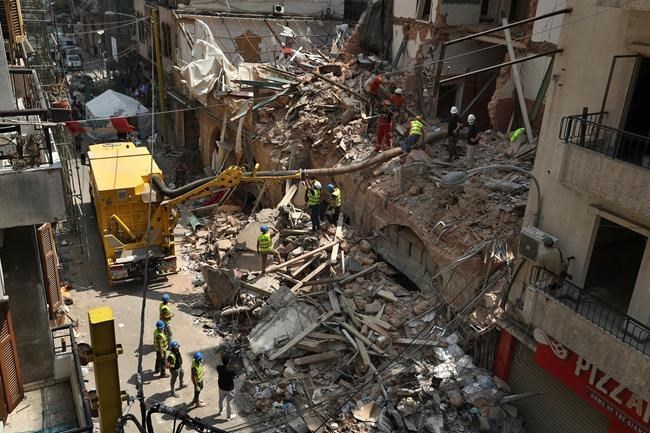
Rescuers search at the site of a collapsed building after getting signals there may be a survivor under the rubble, in Beirut, Lebanon, Friday, Sept. 4, 2020. The fallout from the massive Aug. 4 port explosion in Beirut will keep tens of thousands of children out of school because their schools were levelled or severely damaged. THE CANADIAN PRESS/AP-Bilal Hussein
Republished September 15, 2020 - 2:25 PM
Original Publication Date September 15, 2020 - 1:36 PM
OTTAWA - As fretful Canadian parents mull sending their children to school or opting for at-home learning, poorer countries are coming to grips with no school at all as the only option.
Lebanon has become one of the latest countries to join those ranks as the fallout from the massive Aug. 4 port explosion in Beirut will keep tens of thousands of children out of classrooms because their schools were levelled or severely damaged.
Peter Simms, the education adviser for Plan International Canada, says a lost year of school is threatening to compound the “toxic stress” that young people in Lebanon were already feeling after surviving the explosion.
In Lebanon, 180 schools were damaged in the blast and that will keep 85,000 students out of classrooms.
Across the globe, the lack of school will leave young girls, particularly teens, increasingly vulnerable to abuse, threats, pregnancy and forced marriage, said Simms.
That is threatening to set back two decades' worth of progress in elevating the lives of women and girls in underdeveloped countries unless richer countries invest more in development spending, he said.
“Anybody who tries to stick their head in the sand and say, don’t worry, we’ll just wait for the vaccine and then we’ll be fine, is ignoring the amount of work this will take.”
The Lebanese crisis is one example of a deep and widening education deficit brought on by COVID-19.
In a recent report, the United Nations Children’s Fund estimated that 463 million children were deprived of remote learning because of the pandemic lockdown, while 1.5 billion children were adversely affected by school closures.
The UNICEF reported noted that sub-Saharan Africa was the most affected region, where half of all students were cut off from school.
“Girls and boys across Canada are heading back to school, but millions of children in the world’s toughest places may never go back, including up to one million girls across sub-Saharan Africa,” said Michael Messenger, president of World Vision Canada.
“The growing economic crunch caused by the pandemic has also created a child protection crisis. Both child labour and early marriages are on the rise. If we don’t act now to keep the most vulnerable children in school, the economic impact could be felt for generations.”
A global survey of 25,000 children and their caregivers by Save the Children found that the pandemic had kept two-thirds of students away from learning, while the rate of domestic violence doubled and their family’s income plummeted.
The survey produced a series of troubling findings.
Two-thirds of children said they had no contact with teachers during the lockdown, while as few as one per cent in the poorest regions had access to the internet for remote learning.
The survey also found that girls were disproportionately affected, with 63 per cent saying they did more work around house, compared with 43 per cent of boys.
Bill Chambers, the chief executive of organization’s Canadian branch, said Canada needs to spend potentially billions more in poor countries, and work through multilateral organizations to protect an entire generation of children from losing their future.
“Beyond direct funds, Canada must continue to be a strong voice in supporting debt relief in global forums like the G20,” said Chambers.
“Countries should not have to continue to choose between investing in personal protective equipment, helping children to safely access school, food and safety and paying off interest rates.”
This report by The Canadian Press was first published Sept. 15, 2020.
News from © The Canadian Press, 2020